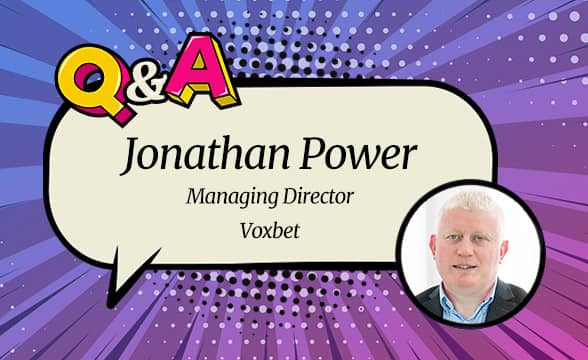Fiona Simmons, Gambling News contributor, speaks to new Voxbet MD, Jonathan Power, about the company’s breakthrough work in the field of voice technology, its implications for the future of betting and the US opportunity in particular
The US market has been a big focus for many in the betting industry. How high on Voxbet’s agenda is it?
The US is very high on our agenda. To date, all operators are competing for the Boomers / Gen Xers sector of the market. In other words, those who know how to use what has been lifted and dropped from old-school sportsbook user interfaces in UK and Europe. The younger – and now larger – demographics won’t readily adapt to interfaces far more complex than any other digital products they use. Voxbet solves this clash of the ages, removing obstacles to engagement for all bettors. As we’ll go on to discuss, we think there’s a real opportunity to differentiate with a Google-style interface sportsbook. Accordingly, the US represents a primary target market for us.
What would you say is Voxbet’s USP?
Simplicity. Once placing a bet can be as easy as speaking it, betting by Voice will become ubiquitous.
What role can content play in differentiating sports betting operators from one another across the US?
Content has been hot for a while now but nobody has nailed it. We have sportsbooks where over 99% of the content is the same. And how that content is navigated is the problem. How can you serve up interesting content, personalised to your user, when your site contains millions of opportunities to bet that must be navigated by scrolling through endless menus? Content can only become a differentiator when it can be personal. And content can only be personal when it is possible to navigate the millions of options on a sportsbook by simply speaking what you want and freeing up to 95% of the real estate currently used by menus. If Spotify had to be navigated the same way as a sportsbook it would be unusable.
In short, content matters and nobody’s ready to reduce the amount of content they offer. Therefore, they’re going to have to offer a better means of navigating it.
And which sports, if any, give Voxbet’s future US partners an edge?
Using your voice to get your bet doesn’t favour any one sport over another. Whichever sport the customer is interested in, it must be accessible via Voice. However, where Voice can really stand out is in play where your bet can be spoken while simultaneously keeping your eyes on the action for a seamless experience.
And do you have a particular target audience?
We have two audiences in mind. Every operator’s user experience is primarily designed for the customer who does not know what they want to back. However, the customer who arrives knowing what they want to bet on is the most prolific and the most profitable customer. Yet they need to go through endless labyrinthine menus to build their bet. So, a key target market for Voxbet is the customers who know what they want to bet on and can simply speak it and complete the transaction in a fraction of the time it currently takes.
As alluded to earlier, another key demographic is young players. These are people who already utilise Voice digitally in their everyday lives. This demographic use Instagram, TikTok, Twitter, Spotify – and on all of these platforms, their experience is personalised to their interests, recognising and framing a user’s proclivities at once. This younger generation will expect, if not demand, a betting experience that is governed by familiar rules of engagement, where the content they are shown is based on their history and declared interests. This isn’t possible using current sportsbook navigation techniques which require endless menus. A Yahoo-style interface will never appeal to the generation that has grown up on Google.
What are Voxbet’s obstacles to entry into the US, especially its state-by-state rollout? Are you talking to anyone exciting / in particular here (operators/affiliates?)?
The main barrier we face at the moment is prioritisation. At present, operator bandwidth is almost entirely consumed by rolling out state-by-state and the accompanying regulatory requirements. Operators in the US have not yet begun to try and differentiate based on user experience. Happily, we know that’s about to change. We have a few very exciting conversations taking place at the moment. As a result, we’re sure Voice betting will hit the US market in 2023 – and we are confident it will be ubiquitous soon afterwards.
Sounds like a sea change is coming!
We firmly believe so. Remember our watchword: ubiquity. In the near future, a bet-mic will be expected on every single sportsbook within a few years. Those currently intimidated or frustrated by the cumbersome complexity of a modern sportsbook use Voice every day in many other aspects of their life. Simply put, Millennials and GenZs do not have the appetite to learn the complex interfaces of sportsbooks that Boomers were saddled with and had no choice but to learn. It is not for nothing that every big tech company has invested tens of billions in voice technology already. If we’re wrong, we’re in excellent company.
Any product-wise, any particular focus?
Voice can take the Betbuilder and request-a-bet model to the next level. That’s low-hanging fruit for Voxbet’s breakthrough tech, but it’s a consequential win nonetheless. As we’ve discussed, bettors simply don’t want to trawl through myriad variables on assists or reams of corners quotes. Just speak it, get your consolidated price, and you’re on.


